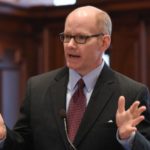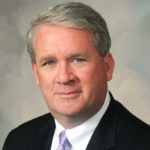SPRINGFIELD, Ill. (IRN) — Census delays could make redistricting a difficult process this year, but political leaders in Illinois say they are committed to fair legislative maps.
There’s also not much clarity on when they’ll be able to start drawing lines for legislative boundaries, but leaders discussing what they think is a “fair map.”
Every ten years, the country redraws political boundaries based on the ten-year Census.
Those numbers are expected to be late. Maps will be needed for the March 2022 primary election.

While leaders agree there needs to be a fair map, Illinois Senate President Don Harmon, D-Oak Park, told the Paul Simon Public Policy Institute the goal is to ensure minority voters have their “fair chance at their choice of a candidate.”
“So if we come up with a structure where more peoples’ voices are heard, where more community of interests are at the table, the map will not only be fair but I am comfortable with the outcome in a partisan manner when more people vote,” Harmon said.
Senate Minority Leader Dan McConchie, R-Hawthorn Woods, said people should be able to pick their leaders.
“It’s fundamental that people be able to choose their own elected representatives instead of their elected representatives choosing them through gerrymandered maps,” McConchie said.

House Minority Leader Jim Durkin, R-Western Springs, said he welcomes that House Speaker Emanuel “Chris” Welch, D-Hillside, and Gov. J.B. Pritzker want a “fair map.”
“And both of them are supporters of something other than what we currently have which is to the victor goes the spoils,” Durkin said. “I’m going to hold the governor and the speaker to their words that they want a fair map.”
Durkin said a fair map isn’t gerrymandered to favor a political party.
Welch told the Economic Club of Chicago a fair map highlights the state’s diversity.
“Look at the Democratic caucus, for instance, diversity is the strength of our caucus,” Welch said. “If you look at the map and it does not reflect the diversity of this state, I don’t know how anyone can call that a fair map.”
Change Illinois Executive Director Madeleine Doubek said the process needs to be transparent and reflect the input of Illinoisans.
“The maps need to uphold the foundational principle of one person, one vote, Doubek said in a statement. “Illinoisans want and expect maps that do not focus on incumbent protection, but do focus on maximizing electoral competitiveness and on keeping their communities of interest.
She said lawmakers need to uphold those principles.
“We cannot have hearings for hearings’ sake,” Doubek said. “We need to see the input and concerns of residents reflected in the maps. Most importantly, we cannot have a situation where final maps are proposed and then voted on within hours of being unveiled.”
Census data for the maps is expected in late September, but the release timeline has already been delayed twice.
By GREG BISHOP for the Illinois Radio Network



